The amount of revenue collected by the State of Oregon from the bicycle excise tax was over $1 million for the first time ever in 2022. And the total amount of new bikes sold in the state have returned to pre-pandemic levels.
Those are two insights we can glean from Oregon Department of Revenue data that has been kept since the bike tax went into effect on January 1st, 2018.
The bike tax was a part of House Bill 2017, the landmark, $5.3 billion transportation package passed by the Oregon Legislature in 2017. In addition to funding projects like freeway expansion megaprojects, rural transit systems, and Safe Routes to Schools infrastructure, the bill included a bevy of new fees to begin the Oregon Department of Transportation’s transition away from the withering gas tax. Vehicle registrations went up, car dealerships had to pay a new “privilege tax” (0.5% on the retail price of any taxable car or truck sold in Oregon), and bicycle riders were dinged $15 at the register for each new bike purchased. The tax applies to bikes priced $200 or more.
BikePortland last took a look at the numbers about two years ago and requested the latest figures from the Department of Revenue.
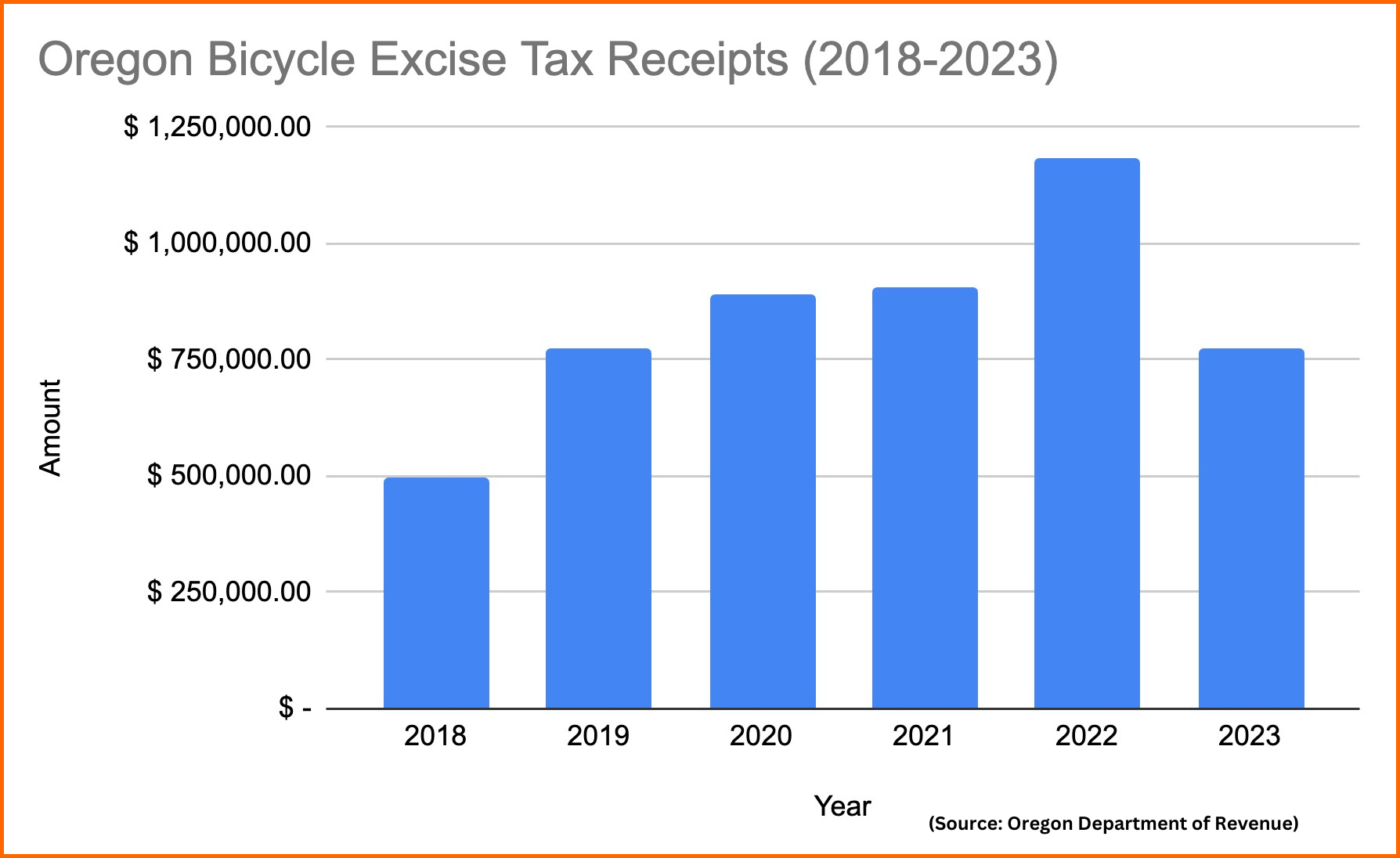
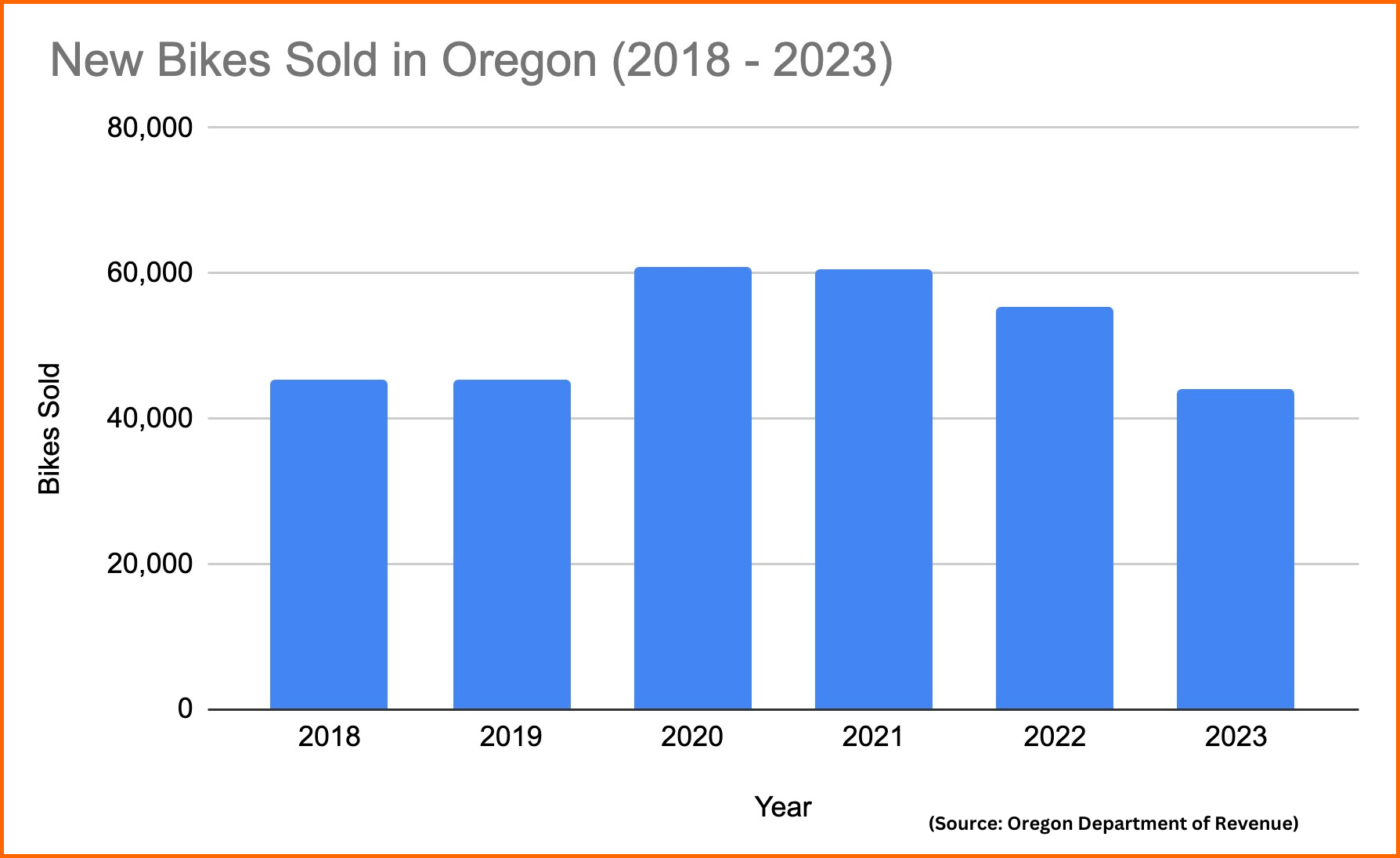
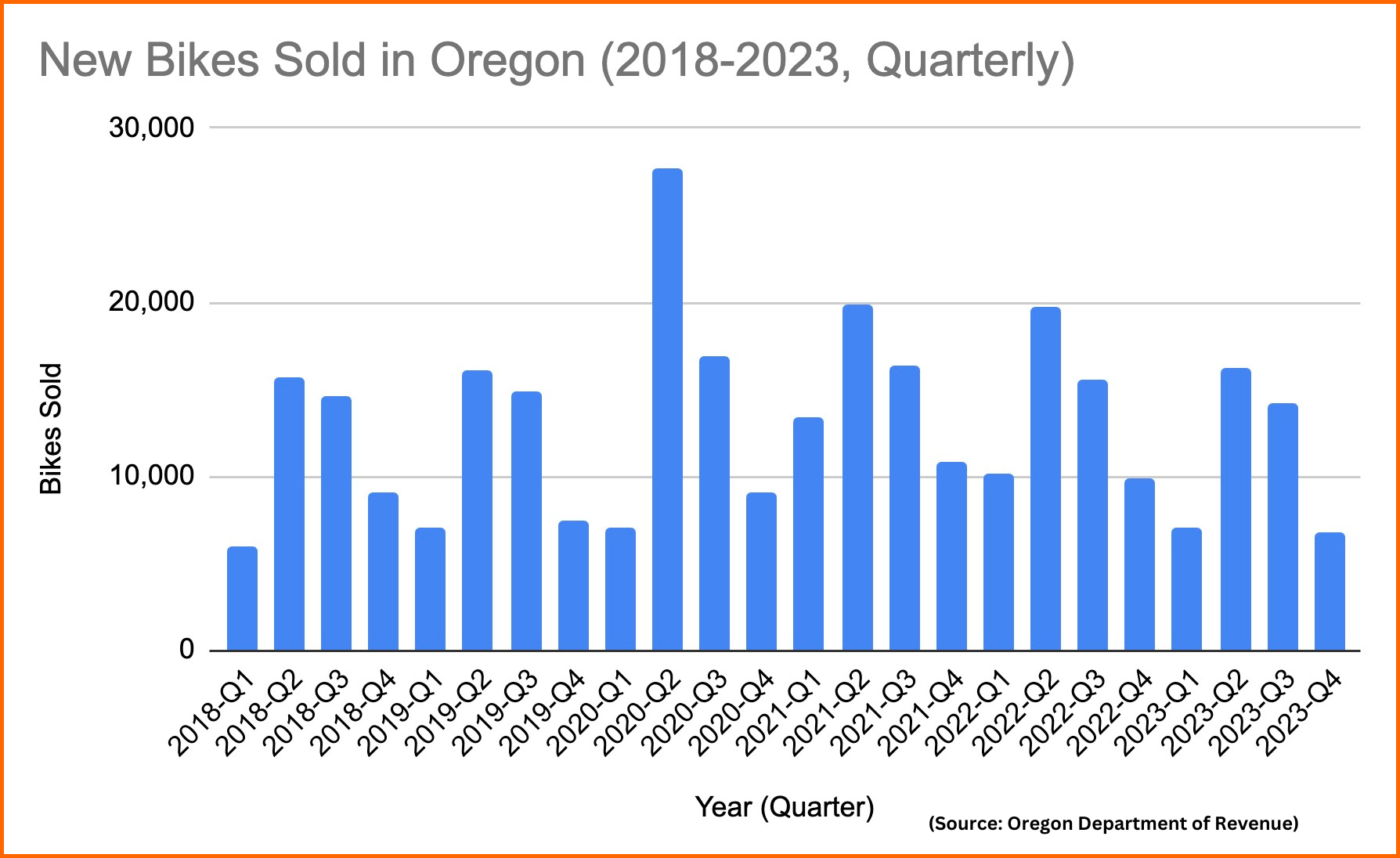
In addition to annual bike tax receipts, DOR gave us our first-ever quarter-by-quarter breakdown of (reported) new bike sales in the state. These numbers illustrate the huge impact of the Covid lockdown-induced bike boom. Oregon’s Covid emergency declaration was made on March 8th, 2020. The first quarter after that declaration we see a huge spike in bike sales and the highest total we’ve seen since.
In Q2 of 2020, the state recorded 27,695 new bike sales, that’s nearly double the 16,073 bikes sold in Q2 of 2019. The total number of new bikes sold in 2020, 2021, and 2022 was around 60,000 bikes. Last year sales decreased by about 33%, to 44,175 bikes — an amount nearly identical to the two pre-pandemic years.
The 2022 tax receipts of $1.2 million fell by about half last year to just $776,000, or about the same as the 2019 amount. One interesting takeaway from the 2022 receipts total is that it’s exactly what state economists estimated when they pitched the tax to lawmakers in 2017. According to DOR, the administrative overhead required to collect the tax was about $39,000 each of the past two years.
Proceeds from the bike tax go into the Oregon Community Paths program. OCP is administered by ODOT and it funds grants for, “project development, construction, reconstruction, major resurfacing or other improvements of multiuse paths that improve access and safety for people walking and bicycling.”




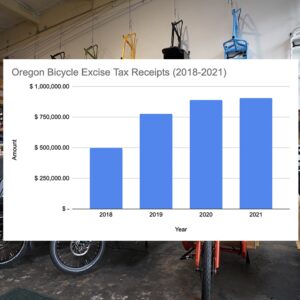
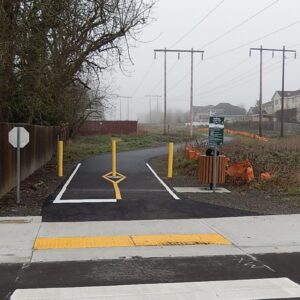

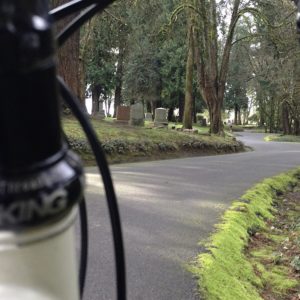
Thanks for reading.
BikePortland has served this community with independent community journalism since 2005. We rely on subscriptions from readers like you to survive. Your financial support is vital in keeping this valuable resource alive and well.
Please subscribe today to strengthen and expand our work.
Will this new info stop motorists from saying people on bikes don’t pay anything for bike lanes?
I’m taking bets.
Jay Cee, “Oh silly wabbit!” 😉
Just imagine if the government gave people tax breaks for buying e-bikes, as it does for electric trucks, cars, and SUVs. And yes, I’d also add free public transit everywhere, all the time. Why aren’t we incentivizing the kinds of transportation that we need in the face of the climate crisis?
Because the majority of people who elect our current government officials don’t believe that the climate crisis is severe enough or that “I’ll just let that group over there take care of it while I go about my life. I recycle isn’t that enough????”
Politicians want to be re-elected so do you really think they’d go against the majority of the voters who would get them back into office or a higher office?
Look how the current mayor and DA have failed Portland and gone against the majority of voters and what they wanted for Portland. Do you think either will be re-elected?
I think this is not only true for “conservatives” or “moderates” but also true for many “progressives” and “leftists”. The immense human impact of this crisis should be toppling governments but instead there is apathy, drunken consumption, and business-as-usual. Future generations will look very unkindly on this era.
Plus it’s just so fun for most people to drive a car around that they can’t ever imagine doing anything else. Most people are lazy and won’t walk even two blocks.
The Earth can burn, they will say, as long as I don’t have to expend any effort.
Hey look! It’s that “drivers are lazy” trope again!
Personally, I think people who use clothes dryers are lazy, but everyone has their reasons. I’m glad you, at least, don’t do this, because drying a load of laundry uses considerably more energy than some lazy person driving two blocks (or even a mile).
And since we’re all “war on cars”, let’s not talk about the emissions related to eating even a small portion of beef…
In Bend today I observed the escalators turned off to reduce their “carbon footprint”!
Suck it up Grandma! Those stairs are good for your arthritis!
In Bend today I observed an escalator at an office complex that was allegedly turned off, per the signage, to reduce their “carbon footprint” and instructing folks to take the stairs. Certainly having Grandma with her cain painstakingly hobble up 2-3 flights is saving the planet! Meanwhile the heat in this building was rather cozy and Tesla’s charged up outside, yet thank goodness progressive climate activists are saving the world one escalator at a time!
Nevermind that in central oregon most of the power comes from hydro, wind, and during the day Solar….
Some places use sensors to activate the escalators when someone approaches. This way they can reduce their carbon footprint while still letting Grandma get a ride up.
Teslas (and other EVs) are a critical tool for reducing emissions, so it’s good that charging points are available. As long as coal is used to “fill the grid” when solar and wind fall short, using less power means using less coal, even if you are paying for “green energy”. If everyone used enough less, those coal plants wouldn’t need to be fired up at all, which would be a good thing for everyone.
Sensors sound good to me but these are straight up blocked off, with a sign virtue signalling why. I suspect this may actually be “deferred maintenance”….
With her Cain she should be Able
Businesses often have a very long time period between when they sell things and when they have to pay the tax to the state, and they can get extensions, so there is often quite a lag before the tax is collected. That’s probably why the tax collection lagged a year or two behind the peak of the bike sales.
Legally, is the $15 per bike a fee or a tax?
An excise tax
I’ll never pay this tax. Ever.
How? – by always buying used bikes off craigslist?
By paying 8.7% sales tax on a $1,000 bike in Vancouver Washington ($87) to avoid the $15 Oregon excise tax, then smuggling it in on some dark night, obviously.
I don’t think the tax applies to online bike sales either. I bought a couple of bikes from State last year and wasn’t charged any tax.
So I just bought my first bike in 15 years since I was a kid, and I was curious what that tax was. Now that I have a bike of course I’m a huge advocate, so I’m all for anything that we’ll make it safer for biking.
Take THAT, haters!
See – cyclists DO pay for their own paths and bike lanes.
How much of the $1.2 million is going toward projects and how much is going for administrative overhead including collections, reporting, and prioritizing what projects will be funded under this program?
When will bike groups work to end this excise tax? Why tax something you want to encourage? I mean a junk food tax makes sense. A tax on bicycles, not so much.
Fine, I’ll buy my next high-end rattle canned bike off the tweaker in inner SE!